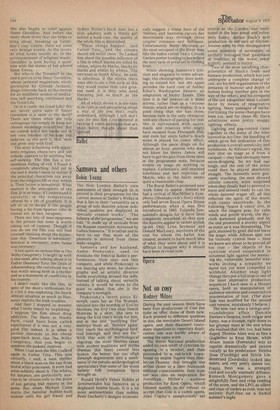Opera
Not so cosy
Rodney Milnes
During the past season there have been four productions of Cosi fun tutte on offer, three of them new. Each pointed to different qualities in this, the inevitable Desert Island opera, and thus disarmed customary objections to repertory duplication: one was hardly aware of seeing the same work.
The Welsh National production added its own whiff of cynicism by opening in a brothel, and then proceeded to a red-brick townhouse no nearer Naples than Henley-on-Thames; this brought the action closer to a Jane Austenish national consciousness. Jane Austen was also an inspiration for Jonathan Miller's austere production for Kent Opera, which faltered mainly in its refusal to accept that Cosi is a comic opera. John Copley's sumptuously set revival at the Garden was traditional in the best sense and extremely funny. Adrian Slack's new production in old sets at Glyndebourne adds to this distinguished series moments of surrealism so tactfully managed that guardians of tradition in the worst sense scarcely seemed to notice.
nYwo of the most satisfying characteristics of Slack's fresh and humane production, which has just undergone a complete change of cast, are his deft organisation of the demands of humour and depth of human feeling (neither gets in the way of the other), and his conquest of the not altogether ideal Luzzati decor by means of imaginative lighting. Many passages of recitative linking the scene changes have been cut, and for these Mr Slack substitutes some pretty snappy lighting effects.
Lighting and gag-control came together in the scene of the false farewell in Act One, the handling of which gives fair indication of this production's overall sensitivity and stylishness. At Alfonso's signal, the men shot on stage as if from a catapult they had obviously been eaves-dropping. So we had our laugh, and the rest of the scene could then be played absolutely straight. The farewells were genuinely touching; the men showed infinite concern, were surprised when they finally had to pretend to leave and seemed ready to call the whole damned wager off; all this reflected the spirit of the music with canny exactitude. In the following 'Soave il vento' trio, in which the singers pray for calm winds and gentle waves, the skycloth darkened gradually and by the end presented a stormy aspect as ironic as it was threatening. The girls, stunned by grief, did not leave the stage; while Alfonso spat out his viciously cynical lines lines we know are about to be proved all too true the objects of his cynicism stood suspended in autumnal light against the menacing sky, vulnerable, beautiful waxworks inviting a sympathy we dared not, yet were compelled to withhold. Another snap light change then put a full stop to one of the most impressive production sequences I have seen in a Mozart opera, both as manipulation of audience emotion and constructive interpretation of text. (Theslow fade was modified for the second cast version, mistakenly 1 believe.)
The new cast was a swings-androundabouts affair. Daniele Perriers's Despina, both vulgar and funny, was a triumph, right down to her grumpy mien at the end when she realised that she, too, had been duped. Thomas Allen was as fine a Guglielmo as Knut Skram, while Anson Austin (Ferrando) was as capable dramatically and unsure vocally as his predecessor. Helena Dose (Fiordiligi) and Sylvia Lindenstrand (Dorabella) looked like sisters, and very pretty sisters too. Frantz Petri was a strangely cool and vocally unsteady Alfonso. Kenneth Montgomery gave a delightfully fleet and crisp reading of the score, and the LPO, as silken and clear of timbre as ever, was not entirely fluff-free on a humid summer's night.


































 Previous page
Previous page